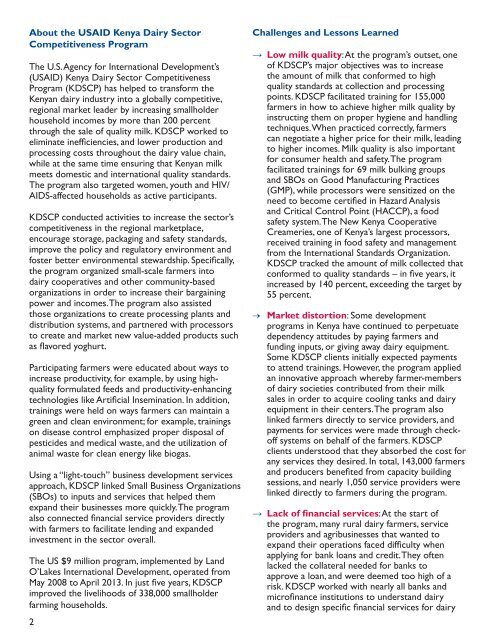USAID Kenya Dairy Sector Competitiveness Program Impact Report
USAID Kenya Dairy Sector Competitiveness Program Impact Report
USAID Kenya Dairy Sector Competitiveness Program Impact Report
Create successful ePaper yourself
Turn your PDF publications into a flip-book with our unique Google optimized e-Paper software.
About the <strong>USAID</strong> <strong>Kenya</strong> <strong>Dairy</strong> <strong>Sector</strong><br />
<strong>Competitiveness</strong> <strong>Program</strong><br />
The U.S. Agency for International Development’s<br />
(<strong>USAID</strong>) <strong>Kenya</strong> <strong>Dairy</strong> <strong>Sector</strong> <strong>Competitiveness</strong><br />
<strong>Program</strong> (KDSCP) has helped to transform the<br />
<strong>Kenya</strong>n dairy industry into a globally competitive,<br />
regional market leader by increasing smallholder<br />
household incomes by more than 200 percent<br />
through the sale of quality milk. KDSCP worked to<br />
eliminate inefficiencies, and lower production and<br />
processing costs throughout the dairy value chain,<br />
while at the same time ensuring that <strong>Kenya</strong>n milk<br />
meets domestic and international quality standards.<br />
The program also targeted women, youth and HIV/<br />
AIDS-affected households as active participants.<br />
KDSCP conducted activities to increase the sector’s<br />
competitiveness in the regional marketplace,<br />
encourage storage, packaging and safety standards,<br />
improve the policy and regulatory environment and<br />
foster better environmental stewardship. Specifically,<br />
the program organized small-scale farmers into<br />
dairy cooperatives and other community-based<br />
organizations in order to increase their bargaining<br />
power and incomes. The program also assisted<br />
those organizations to create processing plants and<br />
distribution systems, and partnered with processors<br />
to create and market new value-added products such<br />
as flavored yoghurt.<br />
Participating farmers were educated about ways to<br />
increase productivity, for example, by using highquality<br />
formulated feeds and productivity-enhancing<br />
technologies like Artificial Insemination. In addition,<br />
trainings were held on ways farmers can maintain a<br />
green and clean environment; for example, trainings<br />
on disease control emphasized proper disposal of<br />
pesticides and medical waste, and the utilization of<br />
animal waste for clean energy like biogas.<br />
Using a “light-touch” business development services<br />
approach, KDSCP linked Small Business Organizations<br />
(SBOs) to inputs and services that helped them<br />
expand their businesses more quickly. The program<br />
also connected financial service providers directly<br />
with farmers to facilitate lending and expanded<br />
investment in the sector overall.<br />
The US $9 million program, implemented by Land<br />
O’Lakes International Development, operated from<br />
May 2008 to April 2013. In just five years, KDSCP<br />
improved the livelihoods of 338,000 smallholder<br />
farming households.<br />
2<br />
Challenges and Lessons Learned<br />
→ Low milk quality: At the program’s outset, one<br />
of KDSCP’s major objectives was to increase<br />
the amount of milk that conformed to high<br />
quality standards at collection and processing<br />
points. KDSCP facilitated training for 155,000<br />
farmers in how to achieve higher milk quality by<br />
instructing them on proper hygiene and handling<br />
techniques. When practiced correctly, farmers<br />
can negotiate a higher price for their milk, leading<br />
to higher incomes. Milk quality is also important<br />
for consumer health and safety. The program<br />
facilitated trainings for 69 milk bulking groups<br />
and SBOs on Good Manufacturing Practices<br />
(GMP), while processors were sensitized on the<br />
need to become certified in Hazard Analysis<br />
and Critical Control Point (HACCP), a food<br />
safety system. The New <strong>Kenya</strong> Cooperative<br />
Creameries, one of <strong>Kenya</strong>’s largest processors,<br />
received training in food safety and management<br />
from the International Standards Organization.<br />
KDSCP tracked the amount of milk collected that<br />
conformed to quality standards – in five years, it<br />
increased by 140 percent, exceeding the target by<br />
55 percent.<br />
→ Market distortion: Some development<br />
programs in <strong>Kenya</strong> have continued to perpetuate<br />
dependency attitudes by paying farmers and<br />
funding inputs, or giving away dairy equipment.<br />
Some KDSCP clients initially expected payments<br />
to attend trainings. However, the program applied<br />
an innovative approach whereby farmer-members<br />
of dairy societies contributed from their milk<br />
sales in order to acquire cooling tanks and dairy<br />
equipment in their centers. The program also<br />
linked farmers directly to service providers, and<br />
payments for services were made through checkoff<br />
systems on behalf of the farmers. KDSCP<br />
clients understood that they absorbed the cost for<br />
any services they desired. In total, 143,000 farmers<br />
and producers benefited from capacity building<br />
sessions, and nearly 1,050 service providers were<br />
linked directly to farmers during the program.<br />
→ Lack of financial services: At the start of<br />
the program, many rural dairy farmers, service<br />
providers and agribusinesses that wanted to<br />
expand their operations faced difficulty when<br />
applying for bank loans and credit. They often<br />
lacked the collateral needed for banks to<br />
approve a loan, and were deemed too high of a<br />
risk. KDSCP worked with nearly all banks and<br />
microfinance institutions to understand dairy<br />
and to design specific financial services for dairy


